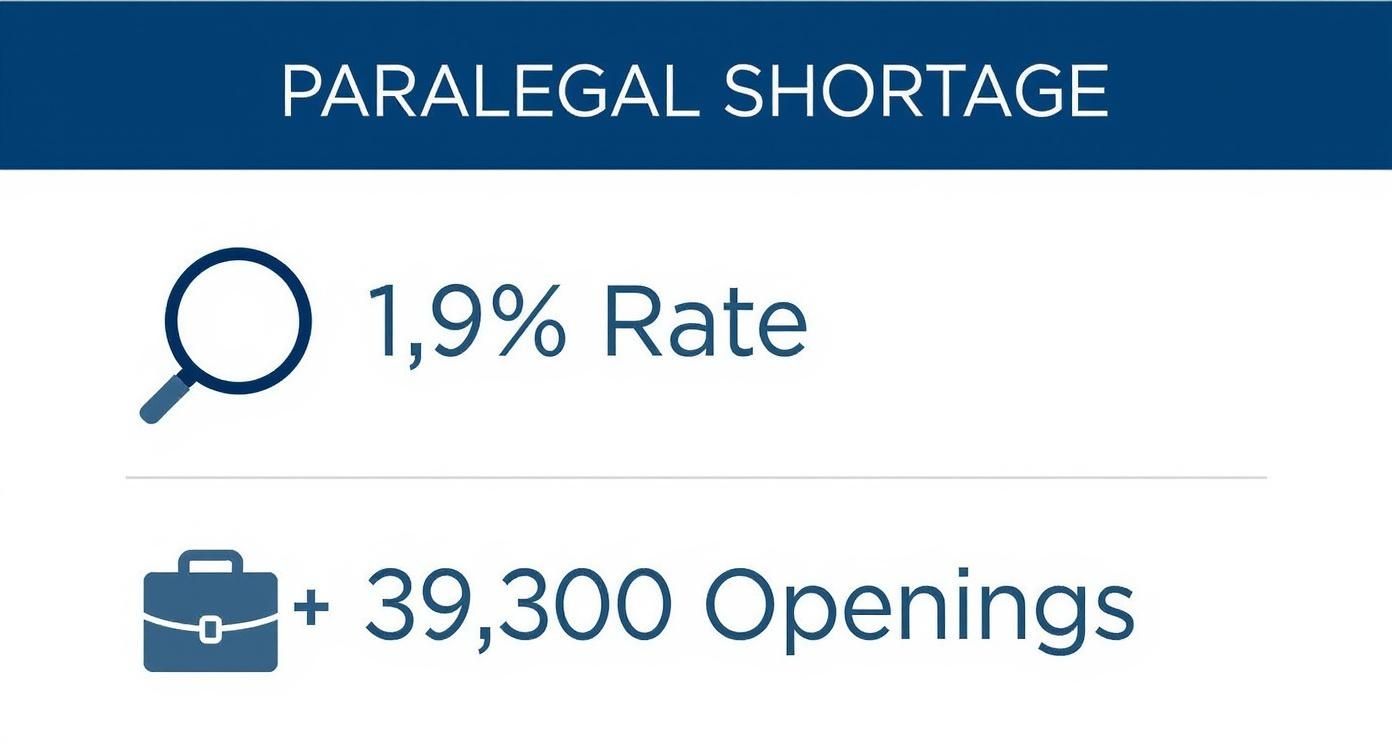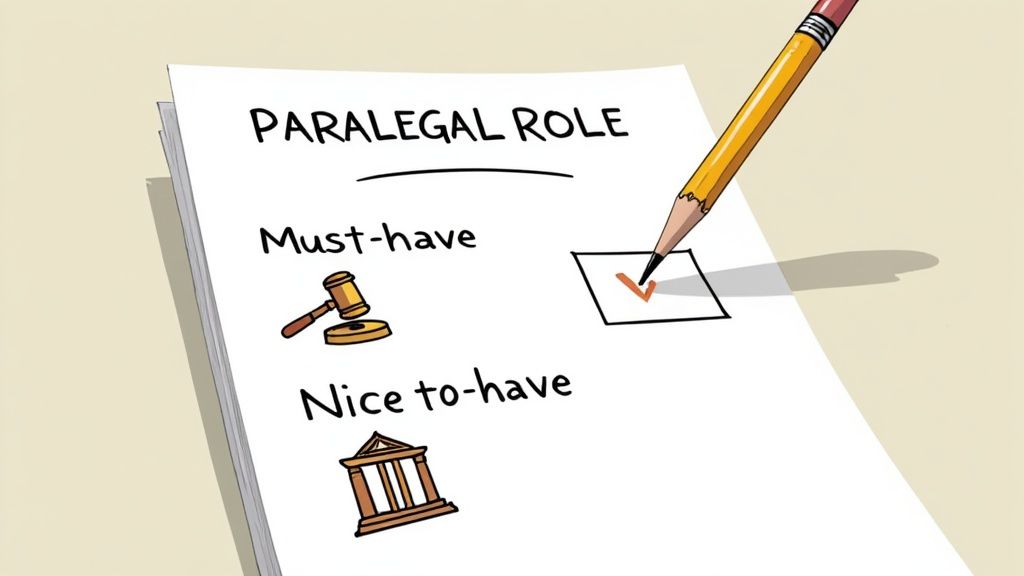
 16 minutes read
16 minutes read
Hiring a paralegal isn’t just about posting a job ad and hoping for the best. It breaks down into a few critical phases: defining the exact needs of your firm, hunting for talent where the pros actually hang out, running an interview process that tests real-world skills, and crafting an offer they won't ghost. Forget the old "post and pray" method; the market has flipped, and having a real strategy is non-negotiable.
Let’s get one thing straight: it’s not just you. Hiring a skilled paralegal right now feels like trying to find a unicorn in a snowstorm. The old playbook of just posting a job ad and waiting for superstars to apply is officially dead and buried.
Welcome to the candidate’s market, where top talent holds all the cards. I’ve lived through the hiring nightmares myself—like the “perfect” candidate on paper who ghosted us after three interviews and a verbal offer. It’s enough to make you want to go back to doing your own discovery requests. (Almost.)
This isn’t a pep talk; it’s a reality check. The talent crunch is real, and if you don’t understand the battlefield, you’ve already lost the war.
Hope you enjoy spending your afternoons fact-checking resumes, because that’s now your side hustle. The pool of available, qualified paralegals has shrunk dramatically. According to the U.S. Bureau of Labor Statistics, the unemployment rate for paralegals and legal assistants was a staggeringly low 1.9% in May 2025. With roughly 39,300 openings projected each year, you're competing for talent more fiercely than ever. You can read the full research on legal role demand to see just how tight the market truly is.
This infographic lays out just how few qualified paralegals are actively looking for work compared to the number of open positions.

The key takeaway here is simple: scarcity. You aren't just looking for a needle in a haystack; you're looking for a specific needle in a very small, highly sought-after stack.
To succeed, we need to throw out the old assumptions about hiring. Here’s a quick look at how things have changed.
| Outdated Belief | Current Reality |
|---|---|
| "A good salary is all that matters." | Flexibility, firm culture, and professional development are now just as important, if not more so. |
| "The best candidates will come to us." | You have to actively hunt for passive candidates. The best ones are usually employed and not actively looking. |
| "A lengthy, multi-stage interview process weeds out the weak." | A slow process just gives your top choice time to accept another offer. Speed and decisiveness win. |
| "A standard job description will do the trick." | Generic posts get ignored. You need to sell the role, the firm, and the opportunity to stand out from the noise. |
This isn't just a minor shift; it's a completely new game with different rules.

This isn’t about scaring you into mortgaging your office ping-pong table. It’s about arming you with the truth so you can stop wasting time on outdated tactics and start making smarter, more strategic moves that actually attract top-tier talent.
Your generic job description and standard offer aren't going to cut it anymore. It's time to adapt or get used to handling your own calendaring.
Stop. Before you copy-paste that dusty paralegal job description from ten years ago, let’s have a talk. It’s a surefire way to attract a hundred unqualified applicants, waste a dozen hours on pointless interviews, and hire absolutely no one of value.
Before you even think about writing a job ad, you need to get brutally honest about what this person will actually do every single day. A vague job description is a magnet for candidates who can’t deliver. You need clarity, and you need it now.

Is this a litigation paralegal who needs to thrive on the adrenaline of discovery deadlines? Or is it a corporate paralegal who will be drowning in entity management and minute books? These are not the same job, and they sure as heck don’t attract the same person. For more specific ideas, check out this detailed corporate paralegal job description.
Let's start with a simple exercise I call the "Pain Point Audit." Forget titles and qualifications for a second. Instead, grab a notebook and answer this question: where is your firm bleeding time and money right now?
Be specific. Don't just write "overwhelmed." Write down the actual tasks that are falling through the cracks or sucking up your attorneys' precious billable hours.
Once you have this list, you've got the raw material for a job description that solves a real problem. You’re no longer just hiring to fill a seat; you’re hiring a specialist to stop the bleeding.

A great paralegal hire isn't about offloading random tasks. It’s a strategic move to fix a specific, costly weakness in your firm's operations. Define the pain first, then find the person with the cure.
With your pain points identified, you can now build a realistic profile of your ideal candidate. Separate your needs into two columns: must-haves and nice-to-haves. Be ruthless.
This isn’t just an internal exercise; it directly shapes your ad. Lead with the must-haves. The demand for paralegals with expertise in high-growth fields has surged. For example, job postings for paralegals with IP experience grew by 25% between 2023 and 2025, and a whopping 70% of all postings now list tech proficiency as a required skill.
By being clear about your core needs, you signal to the right candidates that you know what you’re looking for.
If your entire recruitment strategy is "post on Indeed and pray," you're already behind. Let’s be honest, the best paralegals aren’t desperately scrolling job boards on their lunch break. They're already employed, probably overworked, and getting pinged by recruiters on LinkedIn every other day.
Passive waiting is a losing game. To hire a great paralegal, you need to go hunting where the talent actually lives, not just where the desperate hang out. It's time to build a real talent pipeline so you’re never starting from zero again.
Before you even think about paying a recruiter, look around. Your professional network is your single most valuable, and most overlooked, source of high-quality referrals. The key is to leverage it without being annoying.
Don’t just send a mass email saying, "Hey, know anyone?" That’s lazy and ineffective. Instead, get specific:
A referral from a trusted source is worth ten random applications. It's pre-vetted social proof that tells you this person isn't just competent, but also decent to work with.

The goal isn't to spam your contacts. It's to activate a small, trusted group of allies who understand your standards and can point you toward people who meet them. One great referral beats a hundred mediocre resumes every time.
Posting on major job boards is like fishing with a giant net—you’ll catch a lot of junk. To find the keepers, you need to use the right bait in the right ponds. For a comprehensive approach, it’s worth reviewing some modern candidate sourcing strategies to get a feel for proactive recruitment.
Think niche. Where do detail-oriented, ambitious paralegals gather?
This isn’t about a quick fix. It’s about planting seeds and building relationships before you desperately need to make a hire. It’s the difference between having a pipeline and having a panic attack.
Alright, you’ve sorted through the resumes and found a few candidates who don’t list "Microsoft Word proficiency" as their top skill. Congratulations. Now comes the hard part: an interview process that actually tells you something useful.
A polished resume and a charming personality mean nothing if the candidate crumbles under pressure. Your interview needs to be less of a friendly chat and more of a strategic diagnostic tool. Hope you enjoy your coffee, because this isn’t about making a new friend; it’s about making a smart hire.

Forget asking, "What’s your biggest weakness?" The answer is always a rehearsed humblebrag like, "I’m just too organized!" It’s a useless question that elicits a useless answer. We’re here to separate the talkers from the doers.
This is where the rubber meets the road. I’m a huge believer in a short, practical skills assessment. It’s a simple, real-world task that mirrors the actual demands of the job. You’ll learn more in this 30-minute exercise than you will in two hours of conversation.
Here are a few ideas for your "Paralegal Practical":
This isn't about hazing them; it's about seeing their work product. A candidate who balks at a short practical test is telling you everything you need to know.

Let me be blunt: if a candidate can’t handle a simple, timed task in an interview, they are going to drown when faced with three competing deadlines from three different attorneys. This single step will save you from months of future agony.
Once you’ve seen their skills, you need to understand their behavior. How do they think? How do they react when things go sideways? Standard interview questions often fall flat here, but asking the right behavioral questions can be incredibly revealing. If you need some inspiration, our guide on legal assistant interview questions offers some great starting points.
Instead of generic queries, try these targeted prompts:
Listen for the "I," not the "we." You want to know what they did, not what their team did. Look for specific actions, clear communication, and a sense of ownership. A candidate who gives vague, rambling answers probably has a vague, rambling approach to their work. Your goal is to see them in action, not just hear them talk a big game.
You found them. After sifting through resumes and sitting through interviews, you've identified the perfect paralegal for your firm. Now comes the critical part: making an offer that they’ll actually accept.
Let's get one thing straight. In this market, a lowball offer isn't a smart negotiating tactic; it's a fast track to getting ghosted. The best candidates have choices, and they are fully aware of their market value. Your initial offer needs to be competitive and well-researched right out of the gate.
Before you even think about a number, you need a solid benchmark. Guesswork won't cut it. A competitive salary is the baseline, but that figure can swing dramatically depending on your city, the paralegal’s experience level, and their area of specialty. To get a realistic sense of the going rate, you should review current guides on paralegal hourly rates. This ensures your offer is based on hard data, not just what you think you should pay.
But here's the thing: money isn't the only motivator anymore. Flexibility has become the new currency, and this is where smaller firms can gain a serious advantage.

Big Law might have deeper pockets, but you can offer something far more valuable: a better quality of life. A hybrid work schedule, a genuine commitment to work-life balance, and a budget for professional development can make your offer stand out against one with a slightly higher salary tied to a grueling five-day commute.
This isn’t just a gut feeling; the numbers back it up. A 2025 survey showed that law firms offering hybrid work options saw up to 30% more applications from qualified paralegals than firms requiring a full-time office presence. Flexibility is a powerful magnet for top talent.
Once you’ve put together the complete package—salary, benefits, and those crucial flexibility perks—it's time to extend the offer.
Make the Call First: Always start with a verbal offer over the phone. It's personal, it allows you to express your excitement, and you can gauge their initial reaction. Briefly walk them through the key highlights of the offer.
Follow Up in Writing—Fast: Don't leave them waiting. Immediately after the call, send a formal offer letter by email. This document needs to spell everything out clearly: the full compensation package, the official start date, and any contingencies like a background check.
Set a Clear Deadline: Give them a reasonable but firm timeline to make a decision, usually 48-72 hours. This creates a healthy sense of urgency and keeps the process moving forward.
Once your candidate gives you the verbal "yes," it's time to make it official. To ensure everything is legally buttoned up and crystal clear for both you and your new hire, using a solid employment contract template is a smart move. It formalizes the agreement and sets the stage for a smooth start.
Alright, let's tackle the nagging questions that pop up during every paralegal search. I’ve been there, and I know these are the things that keep managing partners up at night. Here are some quick, no-fluff answers to the queries I hear most often.
There's no single magic number, and anyone who gives you one is selling something. Compensation varies wildly by location, experience, and specialty. You wouldn’t pay a rookie real estate paralegal in Omaha the same as a senior IP litigation paralegal in San Francisco.
In a major city, an experienced litigation paralegal could easily command over $90,000, while in a smaller market, that number might be closer to $60,000. Your best bet is to check recent salary guides from reputable legal recruiting firms. But don't just fixate on salary; think about the full compensation package.

A slightly lower salary with a hybrid work schedule and a real professional development budget is often far more attractive than a higher-paying, fully in-office role with no perks. Don't lose a great candidate by nickel-and-diming on the benefits that actually matter.
Need to? No. Should you seriously consider it? Absolutely, especially if you’re short on time or hunting for a unicorn in a niche practice area.
A good legal recruiter has a pre-vetted network of candidates who aren’t actively scrolling job boards. They know the passive talent—the ones who are currently employed and crushing it. The obvious downside is the cost. Expect to pay a fee of 20-25% of the candidate's first-year salary. Ouch.
If your budget is tight or you're hiring for a generalist role, you can probably manage it yourself using the tactics we've already covered. But if you've been searching for months with no luck, a recruiter can be a very smart investment to stop the bleeding.
Beyond the obvious—like someone who badmouths their last three employers—look for vagueness. If a candidate can't give you specific, concrete examples of how they handled a complex project or a tight deadline, that's a massive red flag. It usually means they watched from the sidelines while someone else did the heavy lifting.
Another is a complete lack of curiosity. A great candidate will come armed with thoughtful questions about the role, the team, and your firm’s biggest challenges. If they have zero questions for you, they're either not engaged or, worse, not that interested. Finally, pay close attention to their comfort level with legal tech. A paralegal who isn’t fluent in e-discovery platforms and modern case management software will slow your entire team down.